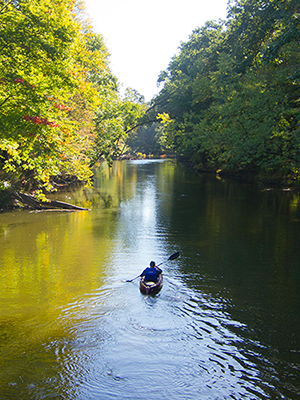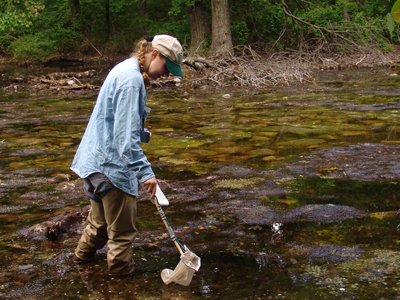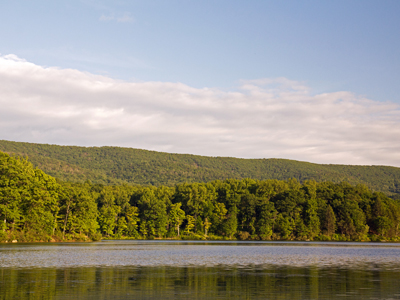Public Policy
Public Funding for Conservation
Public investments in conservation are a vitally important component of support for the Western Pennsylvania Conservancy’s mission and programs. The commitment of federal, state, and local dollars for conservation reflect the widespread endorsement of these priorities by our citizens and communities. The following are some of WPC’s public funding priorities in the state and federal budgets for fiscal year 2024.

Keystone Recreation, Park & Conservation Fund (Key 93)
The Keystone Fund has supported thousands of community park development projects including athletic fields, community centers, playgrounds and pools. Tens of thousands of acres of community open space, wildlife habitat, state forests and parks are forever protected and available for public enjoyment because of the Keystone Fund. Keystone has improved public access and facilities in our state parks and forests. It also has supported community library, museum and higher education construction projects.
Each dollar of Key 93 investment typically leverages a dollar or more in direct local and county investments in our parks, special community green spaces and libraries. The additional benefits brought by improving the livability of our communities and providing recreational and outdoor opportunities to our children are immeasurable.
WPC strongly opposes diverting any dollars from the Keystone Fund into the General Fund, or using them for any other reason than their intended purpose.
Environmental Stewardship Fund (Growing Greener)
Since 1999, Growing Greener has been Pennsylvania’s preeminent program for funding conservation priorities, including land protection, water quality, urban parks and recreation, and historic preservation efforts.
For the past several years, WPC has been directly involved in helping to establish the next generation of the Growing Greener program.
Marcellus Legacy Fund
Act 13 of 2012 created Pennsylvania’s Marcellus Legacy Fund, which reinvests unconventional natural gas drilling fees back into environmental protection and restoration through a suite of grant programs aimed at watershed protection, trails and greenways, and abandoned well cleanup, among others.
WPC supports using the fee collections in this way and has successfully advanced several projects partially funded through this source.
Recovering America’s Wildlife Act (RAWA)
The Recovering America’s Wildlife Act (H.R. 2773 in the 117th Congress) would provide for $1.3 billion annually to fund critically important wildlife conservation efforts in every state. The proposal would enable a comprehensive approach to recovering species in decline.
The Western Pennsylvania Conservancy supports passage of this ambitious legislation that would provide a dedicated and significant source of funding for the type of species-specific studies and science-based products generated by our Pennsylvania Natural Heritage Program partnership.

Great Lakes Restoration Initiative (GLRI)
Established in 2010, GLRI is a coordinated federal effort to invest in the conservation of the Great Lakes region through cleanups, land protection, and invasive species prevention and control.
As of February 2021, this multi-agency initiative has invested $3.8 billion in a wide variety of projects that aim to protect and restore the largest system of fresh water in the nation.
WPC recommends a minimum $320 million annual appropriation for this critical initiative.
State and Tribal Wildlife Grants (SWG)
The State and Tribal Wildlife Grants program funds research and recovery efforts for non-game species and are is instrumental in avoiding conflicts between endangered species and landowners, as the program funds research and recovery efforts for non-game species. With more than 1,200 species of plants and animals considered species of special concern in Pennsylvania, SWG leverages federal dollars to protect or restore wildlife populations more effectively than waiting until the populations reach critically low levels and need "emergency room care" through the Endangered Species Act. Ultimately, State Wildlife Grants saves both our nation's precious wildlife heritage and taxpayer dollars.
WPC supports the highest funding level possible for SWG in FY 2023.
North American Wetlands Conservation Act (NAWCA)
NAWCA emphasizes protection, restoration and management of wetland ecosystems, waterfowl habitat and other bird populations through a two-tiered matching grant program.
WPC supports the highest funding level possible for NAWCA for FY 2023.
Forest Legacy Program (FLP)
The Forest Legacy Program protects privately-owned working forests by acquiring conservation easements on land threatened by conversion. In Pennsylvania, the Forest Legacy Program has completed projects totaling over $13 million in investment, including Michaux State Forest in Adams County and the Birdsboro Waters project in Berks County
The Conservancy opposes any detrimental changes to Forest Legacy in the next Farm Bill, and supports amending the program to include an option to allow third parties to hold easements.
WPC supports a funding level of at least $128 million for FY 22 for the Forest Legacy Program.

Community Forestry and Open Space Program
The Community Forest Program is a grant program that authorizes the U.S. Forest Service to provide financial assistance to local governments, tribal governments, and qualified nonprofit entities to establish community forests that provide tangible educational, economic and environmental benefits.
WPC has signed on to a letter asking for $8 million for this program in FY 23.
Community Development Block Grants (CDBG)
CDBG is a flexible, community-based federal program that allows cities to target funding at a wide variety of neighborhood improvement projects directed towards revitalizing neighborhoods, economic development and providing improved community facilities and services in low- and moderate-income areas.
WPC receives funding for volunteer driven community flower gardens in CDBG-designated communities in the city of Pittsburgh.
Allegheny Regional Asset District (ARAD)
Funded by the 1% county-wide sales tax, the Regional Asset District finances libraries, parks and recreation projects, sports and cultural facilities and programs. The Conservancy receives operating and capital grant support for its gardens in Allegheny County.
